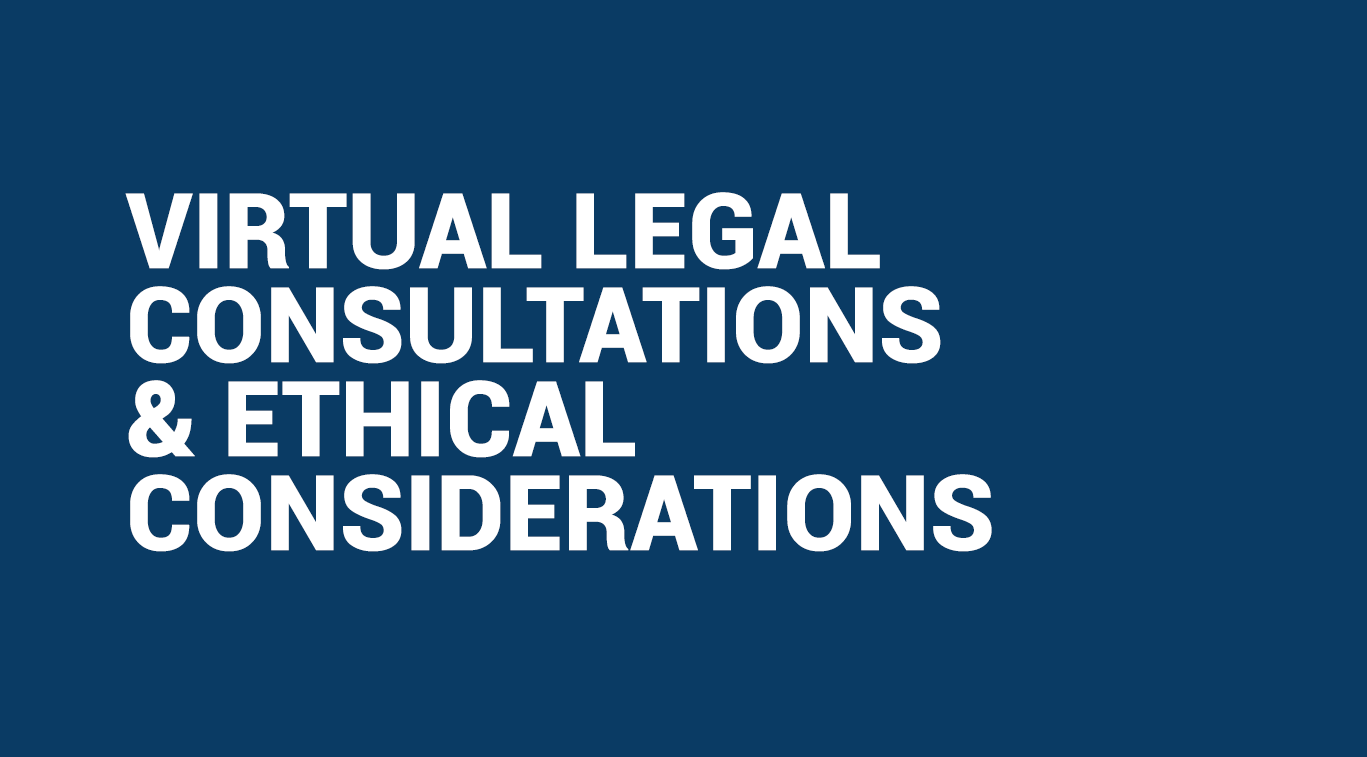Virtual Legal Consultations & Ethical Considerations

Written by Fatima Freifer
Blogger

Due to the worldwide Covid-19 pandemic, the number of lawyers working remotely has recently increased. This will be a difficult time for some, but the legal sector thrives on remote working, and legal teams across the country will most likely rise to the occasion. It may also have some advantages. According to studies, lawyers who work from home are more productive and use less sick leave than their colleagues.
Technology is a tool used by law firms to reduce costs and improve service delivery. The ultimate goal of utilising technology in the legal profession is to enable firms to operate more efficiently and effectively.
Video conferencing is important to lawyers and the firms for which they work because it allows them to save money while also improving client service. Modern video conferencing solutions for lawyers have made many legal services and processes more convenient and efficient for both lawyers and their clients.
Keeping up with Legal Developments
The current legal landscape is rapidly changing, and not having colleagues nearby will limit exposure to current trends in the industry. Spending a short amount of time each day reading up on what has been going on will help to counteract this. It is also useful to discuss this with co-workers. Keeping industry knowledge up to date is critical to keeping on top of news – especially needing to isolate in the coming weeks.
Versatility of Movement
Law as a profession is extremely mobile, and with the help of technology, a lawyer’s work can now be done almost anywhere. Most lawyers will practice outside the office in a variety of settings such as client meetings, tribunals and court. Working from home is an example of another location. Many courts have moved to remote hearings, at least in some cases.
The rapid transition to virtual appearances introduces new challenges, such as how to allow people to observe proceedings without allowing them to interfere. Another issue is balancing the presumed advantage that tech-savvy law firms may have over competitors with fewer resources.
It is unclear whether courts will adopt standardised virtual appearance procedures. Lawyers may have to learn how to use different platforms for different courts—in fact, emergency coronavirus rules have given most courts discretion over how to conduct remote hearings.
Shortfalls in Communication
Virtual meetings, the current method of communication and collaboration, present challenges that face-to-face meetings do not. In one study, 82 percent of virtual teams fell short of their goals, 33 percent rated themselves as largely unsuccessful and 66 percent failed to meet the needs of their clients. [1]
There is no substitute for face-to-face communication, whether it is a client meeting, a court appearance or a mediation session. However, given the limitations imposed by the coronavirus, today’s technology provides a reasonable compromise in the form of video conferencing and other real-time communication.
Lawyers must be both well-equipped for virtual communication and confident in the security of their platforms. They must be prepared in this regard for both the short and long term, as all indications indicate that even after the pandemic has passed, people will not gather in person as much as they used to.
Boosting Client and Lawyer Relations
Lawyers work in a highly complex field that requires a great deal of work to be done behind the scenes. Clients are frequently perplexed by the work of legal experts and must rely on appearances to make critical decisions. Clients must feel empowered to evaluate the quality of service they are receiving, even if they do not understand the specific legal details of their cases. Lawyers have their work cut out for them because they must demonstrate confidence and competence in order to attract and retain clients.
A client may not fully comprehend the legal aspects of their case, but their initial feeling about the lawyer they are communicating with can have a significant impact on the case outcome. When a client trusts their lawyer, they are more likely to divulge information and follow instructions more willingly. [2]
Planning Meetings in Advance
Planning and leading virtual meetings ensures efficiency and contributes to the creation of an atmosphere in which people feel their time was well spent. Planning ahead of time so that important discussions can take place, important decisions can be made and people leave knowing what they are expected to do, is always a good point of call. Determining the goal, expected outcomes and agenda will be facilitated as a result.
If a particular discussion or decision hinges on whether participants have reviewed and analysed information, it is more effective to distribute it well in advance of the meeting, with a note to review and analyse before the meeting.
Optimising Meeting Output
Client ability to concentrate and participate is critical to the success of virtual meetings. Emotions, physical health and any thoughts taking up space in a person’s brain are all competing forces that can inadvertently interfere with concentration and participation.
Allowing people to acknowledge and share this information at the start of a meeting reduces these issues. Clients, for example, are concerned about their legal issues. Requesting that they use collaboration technology without first alleviating their anxiety adds another layer of stress and undermines efficient and effective communication.
Norms increase the efficiency and effectiveness of discussions and decisions while also fostering trust and cohesion. Meeting norms for groups are agreements on behaviours that: set the tone, generate all relevant data for discussion, encourage robust, data-driven discussions that lead to decisions and generate decisions that the people assigned to the project are willing and able to implement.
Conclusion
Historically, technology that assists lawyers in the practice of law has lagged behind other types of technology. However, recent advancements have been rapid, to the point where in-market legal programmes and applications can alleviate some of the burdens of working remotely, reduce overhead, and improve client communications.
Law firms must continue to operate as normally as possible in the age of coronavirus and depleted government stimulus funds. This entails continuing to meet with prospective clients. For the time being, this may only be possible virtually.
References
[1] 4 Tips for Lawyers Meeting Virtually with Colleagues and Clients, Susan Letterman White, Jul 2020, https://www.masslomap.org/4-tips-for-lawyers-meeting-with-colleagues-and-clients-virtually/
[2] Research Report: 7 Best Practices for Attorneys Adapting to COVID-19, Martindale-Avvo, May 2020, https://www.martindale-avvo.com/blog/research-report-7-best-practices-for-attorneys-adapting-to-covid-19/








